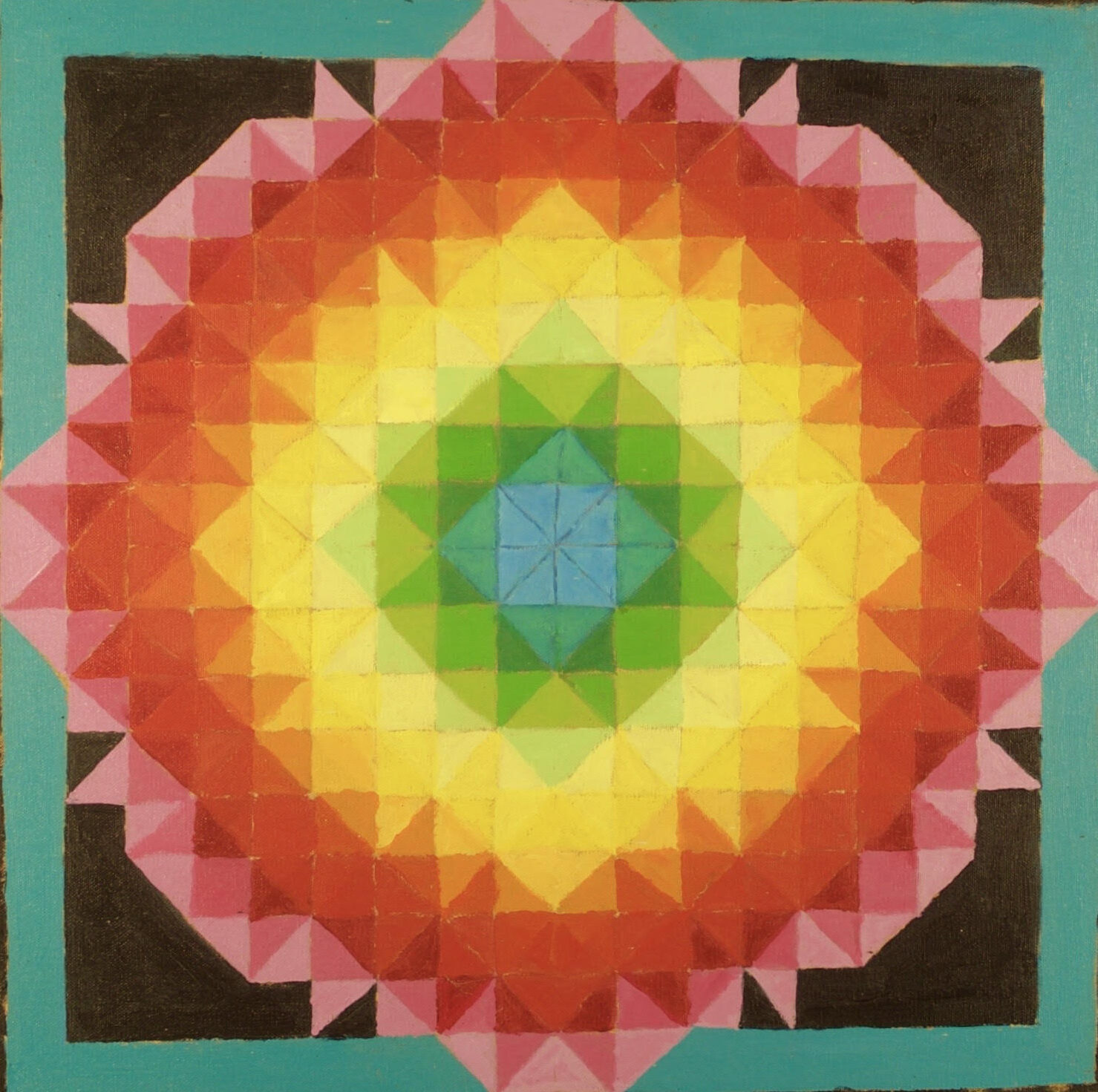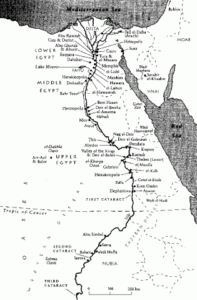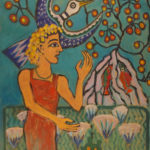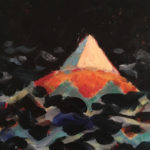Compiled from various sources, mostly the Greek Plutarch
In the beginning, before there was any land of Egypt, all was darkness, and there was nothing but a great waste of water called Nun. The power of Nun was such that there arose out of the darkness a great shining egg, and this was Re.
Now Re was all-powerful, and he could take many forms. His power and the secret of it lay in his hidden name; but if he spoke other names, that which he named came into being.
“I am Khepera at the dawn, and Re at noon, and Tem in the evening,” he said. And the sun rose and passed across the sky and set for the first time.
Then he named Shu, and the first winds blew; he named Tefnut the spitter, and the first rain fell. Next he named Geb, and the earth came into being; he named the goddess Nut, and she was the sky arched over the earth with her feet on one horizon and her hands on the other; he named Hapi, and the great River Nile flowed through Egypt and made it fruitful.
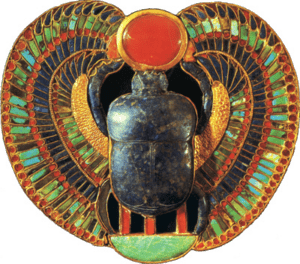
After this Re named all things that are upon the earth, and they grew. Last of all he named mankind, and there were men and women in the land of Egypt.
Then Re took on the shape of a man and became the first Pharaoh, ruling over the whole country for thousands and thousands of years, and giving such harvests that for ever afterwards the Egyptians spoke of the good things “which happened in the time of Re”.
But, being in the form of a man, Re grew old. In time men no longer feared him or obeyed his laws. They laughed at him, saying: “Look at Re! His bones are like silver, his flesh like gold, his hair is the colour of lapis lazuli!”
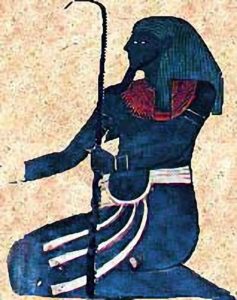
Re was angry when he heard this, and he was more angry still at the evil deeds which men were doing in disobedience to his laws. So he called together the gods whom he had made – Shu and Tefnut and Geb and Nut – and he also summoned Nun. Soon the gods gathered about Re in his Secret Place, and the goddesses also. But mankind knew nothing of what was happening, and continued to jeer at Re and to break his commandments. Then Re spoke to Nun before the assembled gods: “Eldest of the gods, you who made me; and you gods whom I have made: look upon mankind who came into being at a glance of my Eye. See how men plot against me; hear what they say of me; tell me what I should do to them. For I will not destroy mankind until I have heard what you advise.”
Then Nun said: “My son Re, the god greater than he who made him and mightier than those whom he has created, turn your mighty Eye upon them and send destruction upon them in the form of your daughter, the goddess Sekhmet.”
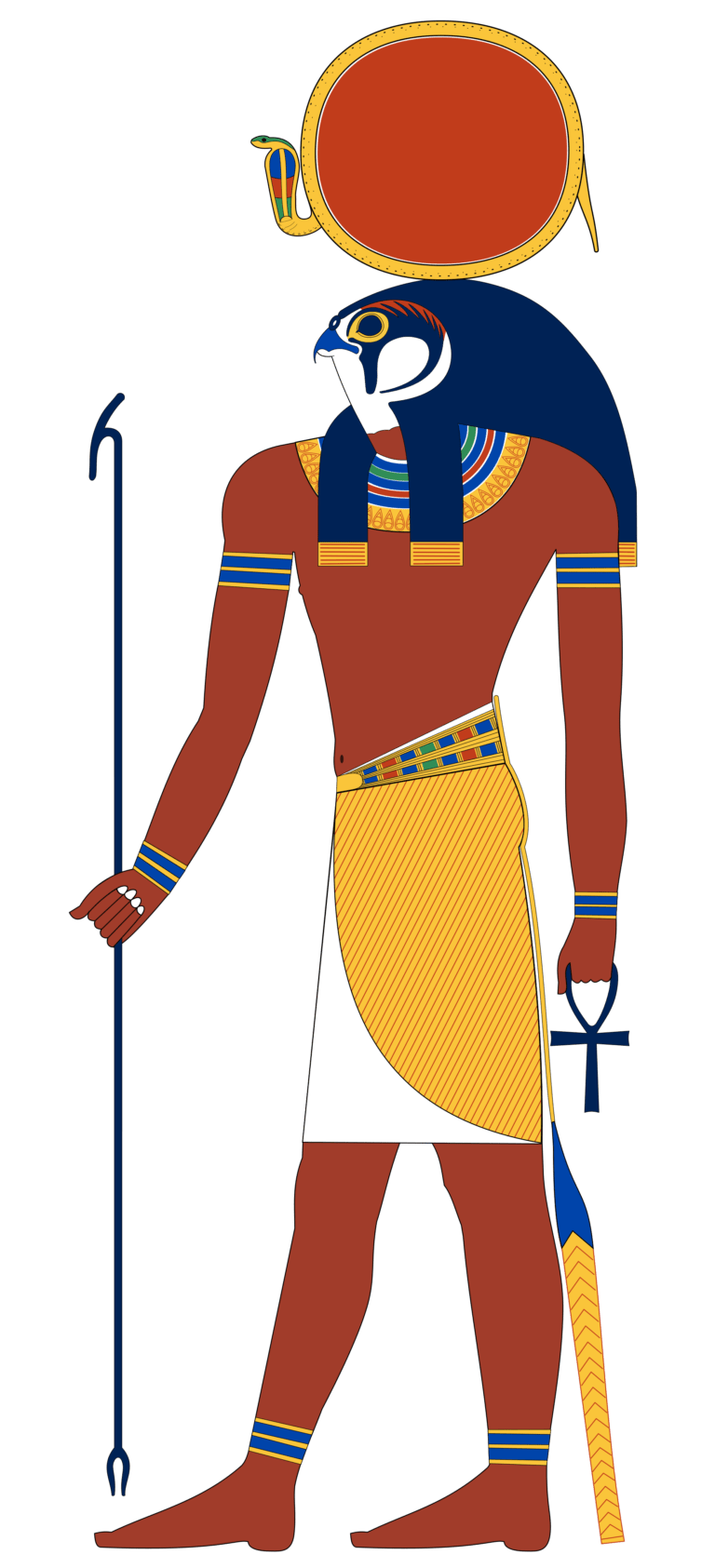
Re answered: “Even now fear is falling upon them and they are fleeing into the desert and hiding themselves in the mountains in terror at the sound of my voice.”
“Send against them the glance of your Eye in the form Sekhmet!” cried all the other gods and goddesses, bowing before Re until their foreheads touched the ground. “…and her chief delight was in slaughter, and her pleasure was in blood.”
So at the terrible glance from the Eye of Re his daughter Sekhmet came into being, the fiercest of all goddesses. Like a lion she rushed upon her prey, and her chief delight was in slaughter, and her pleasure was in blood. At the bidding of Re she came into Upper and Lower Egypt to slay those who had scorned and disobeyed him: she killed them among the mountains which lie on either side of the Nile, and down beside the river, and in the burning deserts. All whom she saw she slew, rejoicing in slaughter and the taste of blood.
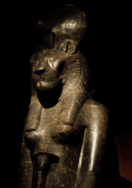
Presently Re looked out over the land and saw what Sekhmet had done. Then he called to her, saying: “Come, my daughter, and tell me how you have obeyed my commands.”
Sekhmet answered with the terrible voice of a lioness as she tears her prey: “By the life which you have given me, I have indeed done vengeance on mankind, and my heart rejoices.”
Now for many nights the Nile ran red with blood, and Sekhmet’s feet were red as she went hither and thither through all the land of Egypt slaying and slaying.
Presently Re looked out over the earth once more, and now his heart was stirred with pity for men, even though they had rebelled against him. But none could stop the cruel goddess Sekhmet, not even Re himself: she must cease from slaying of her own accord and Re saw that this could only come about through cunning.
So he gave his command: “Bring before me swift messengers who will run upon the earth as silently as shadows and with the speed of the storm winds.” When these were brought he said to them: “Go as fast as you can up the Nile to where it flows fiercely over the rocks and among the islands of the First Cataract; go to the isle that is called Elephantine and bring from it a great store of the red ochre which is to be found there.”
The messengers sped on their way and returned with the blood-red ochre to Heliopolis, the city of Re where stand the stone obelisks with points of gold that are like fingers pointing to the sun. It was night when they came to the city, but all day the women of Heliopolis had been brewing beer as Re bade them.
Re came to where the beer stood waiting in seven thousand jars, and the gods came with him to see how by his wisdom he would save mankind.
“Mingle the red ochre of Elephantine with the barley-beer,” said Re, and it was done, so that the beer gleamed red in the moonlight like the blood of men.
“Now take it to the place where Sekhmet proposes to slay men when the sun rises,” said Re. And while it was still night the seven thousand jars of beer were taken and poured out over the fields so that the ground was covered to the depth of nine inches — three times the measure of the palm of a man’s hand-with the strong beer, whose other name is “sleep-maker”.
When day came Sekhmet the terrible came also, licking her lips at the thought of the men whom she would slay. She found the place flooded and no living creature in sight; but she saw the beer which was the colour of blood, and she thought it was blood indeed — the blood of those whom she had slain.
Then she laughed with joy, and her laughter was like the roar of a lioness hungry for the kill. Thinking that it was indeed blood, she stooped and drank. Again and yet again she drank, laughing with delight; and the strength of the beer mounted to her brain, so that she could no longer slay.
At last she came reeling back to where Re was waiting; that day she had not killed even a single man.
Then Re said: “You come in peace, sweet one.” And her name was changed to Hathor, and her nature was changed also to the sweetness of love and the strength of desire. And henceforth Hathor laid low men and women only with the great power of love. But for ever after her priestesses drank in her honour of the beer of Heliopolis coloured with the red ochre of Elephantine when they celebrated her festival each New Year.
So mankind was saved, and Re continued to rule old though he was. But the time was drawing near when he must leave the earth to reign for ever in the heavens, letting the younger gods rule in his place. For dwelling in the form of a man, of a Pharaoh of Egypt, Re was losing his wisdom; yet he continued to reign, and no one could take his power from him, since that power dwelt in his secret name which no one knew but himself. If only anyone could discover his Name of Power, Re would reign no longer on earth; but only by magic arts was this possible.
